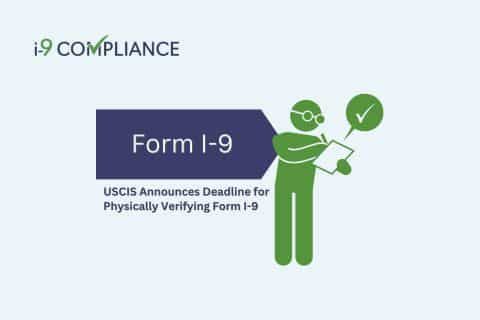USCIS Announces Deadline for Physically Verifying Form I-9

July 7, 2023
Due to the pandemic that started in 2020, the federal government allowed employers to verify employment eligibility (Form I-9) documents remotely. However, these flexibilities will officially end soon, requiring employers to conduct physical document examinations by August 30. According to federal law, employers must verify the employment eligibility of all new hires.
Before the pandemic, the federal government required all employers to have these documents physically reviewed. Employees had to fill out Form I-9s while providing work authorizations and identity documents. In response, the employer or their representative would inspect the documents with the employee, finishing the verification process together.
However, the pandemic allowed the government to enact temporary flexibilities for completing Form I-9s. These flexibilities allowed employers to complete the process remotely with employees who chose not to work in the workplace. Remote inspections included email, video conference, or other approved methods.
As of May 2023, the U.N. World Health Organization (WHO) declared an end to the COVID-19 public health emergency. The U.S. Immigration and Customs Enforcement (ICE) announced the end of the pandemic flexibilities in tandem. ICE declared that the flexibilities would terminate on July 31, 2023. The agency will allow employers 30 days to comply with the physical inspection requirements, making August 30 the final deadline.
With the deadline fast approaching, the USCIS provided guidance for employers to ensure they complete the physical inspections correctly. This guidance explains how to notate remote inspections and the subsequent in-person reviews. When reviewing remotely inspected documents, employers must include their full name, title, and inspection date in the Additional Information Field. Employers who fail to finish the inspection by August 1 should explain the delay in the appropriate field.
Employers unable to inspect the I-9 documents can use an authorized representative. This representative can be anyone the employer designates, such as an agent, attorney, or notary public. This representative will then complete and sign the I-9 form. Employers still maintain responsibility for any violations associated with the verification process, even when employing an authorized representative.
Many employers have found the Form I-9 process complicated due to continuous changes. As such, employers should consider using an electronic I-9 management system. This powerful tool guides users through the process, ensuring accuracy and compliance. It also securely stores the forms and accompanying documentation, offering peace of mind and streamlined record-keeping for employers.
When it comes to your work, automation makes eligibility verification quick and seamless. Get a head start today with I-9 Compliance.